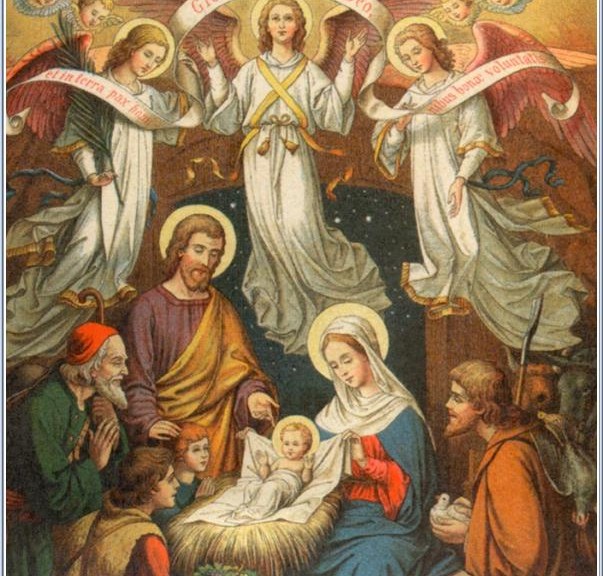The book of Malachi marks the end of the Old Testament. Yes, we have the apocryphal accounts of the Maccabees and the Jewish revolt, but Malachi marks the end of the prophets and then for 400 years God is silent. God is silent until Zachariah entered the Holy of Holies, at which time Zachariah is struck dumb, i.e. rendered silent.
Let’s take a look at that, and let’s pay careful attention to the reason why Zachariah was forced silent, because God did it for a very special reason.
Luke 1:5 There was in the days of Herod, the king of Judaea, a certain priest named Zacharias, of the course of Abia: and his wife was of the daughters of Aaron, and her name was Elisabeth.
“Of the course of Abia” means that Zachariah was not just a normal Levite; he was the son of Aaron.
You can read in 1 Chronicles 23 where David divided the sons of Aaron into 24 groups. The eighth group being Abia. Eight, in biblical numerics, being new beginnings, and we are going to have a new beginning here.
You have to understand that the sons of Aaron were different from the rest of the Levites. God had given them several jobs that only they were to perform (it’s a study in and of itself), and they were the only ones allowed to go into the Holy of Holies. They also had several special duties that only they were allowed to perform. It was the job of the rest of the Levites to help to make sure that the sons of Aaron could do their jobs. Now let’s look at numbers 18:1 and tell me if that doesn’t get your Christian gears turning.
Numbers 18:1 And the LORD said unto Aaron, Thou and thy sons and thy father’s house with thee shall bear the iniquity of the sanctuary: and thou and thy sons with thee shall bear the iniquity of your priesthood.
Okay, let’s head back to Luke.
Luke 1:6 And they were both righteous before God, walking in all the commandments and ordinances of the Lord blameless.
(7) And they had no child, because that Elisabeth was barren, and they both were now well stricken in years.
Now, the reason that they were old was because the priesthood, as it was at that time, was also old.
Luke 1:8 And it came to pass, that while he executed the priest’s office before God in the order of his course, (9) According to the custom of the priest’s office, his lot was to burn incense when he went into the temple of the Lord. (10) And the whole multitude of the people were praying without at the time of incense.
Meaning that he was alone in the Holy of Holies.
Luke 1:11 And there appeared unto him an angel of the Lord standing on the right side of the altar of incense. (12) And when Zacharias saw him, he was troubled, and fear fell upon him. (13) But the angel said unto him, Fear not, Zacharias: for thy prayer is heard; and thy wife Elisabeth shall bear thee a son, and thou shalt call his name John.
The name John means God, or Yah, is a gracious giver. And He is a gracious giver because He is about to give us the last levitical priest.
Luke 1:14 And thou shalt have joy and gladness; and many shall rejoice at his birth. (15) For he shall be great in the sight of the Lord, and shall drink neither wine nor strong drink; and he shall be filled with the Holy Ghost, even from his mother’s womb. (16) And many of the children of Israel shall he turn to the Lord their God. (17) And he shall go before him in the spirit and power of Elias, to turn the hearts of the fathers to the children, and the disobedient to the wisdom of the just; to make ready a people prepared for the Lord.
Remember how I brought up Malachi at the start of this article? Well this is the reason: because that was the last promise God gave before going silent.
Malachi 4:4 Remember ye the law of Moses my servant, which I commanded unto him in Horeb for all Israel, with the statutes and judgments. (5) Behold, I will send you Elijah the prophet before the coming of the great and dreadful day of the LORD: (6) And he shall turn the heart of the fathers to the children, and the heart of the children to their fathers, lest I come and smite the earth with a curse.
Luke 1:18 And Zacharias said unto the angel, Whereby shall I know this? for I am an old man, and my wife well stricken in years.
Okay guys, just for the record, if an angel of the Lord shows up and tells you something is going to happen, tells you that your prayers are answered, don’t ask stupid questions.
Luke 1:19 And the angel answering said unto him, I am Gabriel, that stand in the presence of God; and am sent to speak unto thee, and to shew thee these glad tidings. (20) And, behold, thou shalt be dumb, and not able to speak, until the day that these things shall be performed, because thou believest not my words, which shall be fulfilled in their season.
Now, up until this time, Zachariah was a pretty good ‘ol boy. I mean, how many of us could it be said to be “righteous before God, walking in all the commandments and ordinances of the Lord blameless”? So I don’t want to beat up on Zachariah too much, but we have to understand the parallel God is giving us. Israel had turned from God. The book of Jeremiah tells us that He divorced Israel, and since the book of Malachi had been silent. Ever since Moses complained to God saying that he wasn’t good at speaking, Aaron and his sons have been speaking for God. God wants us to know that He had silenced them.
Luke 1:21 And the people waited for Zacharias, and marvelled that he tarried so long in the temple. (22) And when he came out, he could not speak unto them: and they perceived that he had seen a vision in the temple: for he beckoned unto them, and remained speechless. (23) And it came to pass, that, as soon as the days of his ministration were accomplished, he departed to his own house. (24) And after those days his wife Elisabeth conceived, and hid herself five months, saying, (25) Thus hath the Lord dealt with me in the days wherein he looked on me, to take away my reproach among men.
Now, for the sake of this article, let’s jump down to verse 57.
Luke 1:57 Now Elisabeth’s full time came that she should be delivered; and she brought forth a son. (58) And her neighbours and her cousins heard how the Lord had shewed great mercy upon her; and they rejoiced with her. (59) And it came to pass, that on the eighth day they came to circumcise the child; and they called him Zacharias, after the name of his father. (60) And his mother answered and said, Not so; but he shall be called John. (61) And they said unto her, There is none of thy kindred that is called by this name. (62) And they made signs to his father, how he would have him called.
This is interesting to note because John wasn’t going to be like any of his other kindred. He was the sign of something new, but he was also the symbol of all that came before. All the Law and the prophets that paved the way and told us of the coming of Jesus, just as John the Baptist was the man that made the path straight for Jesus. Can you see the parallel?
Luke 1:63 And he asked for a writing table, and wrote, saying, His name is John. And they marvelled all. (64) And his mouth was opened immediately, and his tongue loosed, and he spake, and praised God. (65) And fear came on all that dwelt round about them: and all these sayings were noised abroad throughout all the hill country of Judaea. (66) And all they that heard them laid them up in their hearts, saying, What manner of child shall this be! And the hand of the Lord was with him. (67) And his father Zacharias was filled with the Holy Ghost, and prophesied, saying, (68) Blessed be the Lord God of Israel; for he hath visited and redeemed his people, (69) And hath raised up an horn of salvation for us in the house of his servant David; (70) As he spake by the mouth of his holy prophets, which have been since the world began: (71) That we should be saved from our enemies, and from the hand of all that hate us; (72) To perform the mercy promised to our fathers, and to remember his holy covenant; (73) The oath which he sware to our father Abraham, (74) That he would grant unto us, that we being delivered out of the hand of our enemies might serve him without fear, (75) In holiness and righteousness before him, all the days of our life. (76) And thou, child, shalt be called the prophet of the Highest: for thou shalt go before the face of the Lord to prepare his ways; (77) To give knowledge of salvation unto his people by the remission of their sins, (78) Through the tender mercy of our God; whereby the dayspring from on high hath visited us, (79) To give light to them that sit in darkness and in the shadow of death, to guide our feet into the way of peace. (80) And the child grew, and waxed strong in spirit, and was in the deserts till the day of his shewing unto Israel.
So we see that, even with the silence of Zachariah, God has a purpose. Just as He had a reason for John to come from old parents, to show John came from the old covenant. And He had a reason for Jesus to come from a young virgin: to show that, with Jesus, everything is made new, and that the greater covenant is ours if we will only accept it. He has a purpose for you, me, and everyone else, and it’s up to us to look for that purpose. To seek Him and His wisdom.
God Bless








